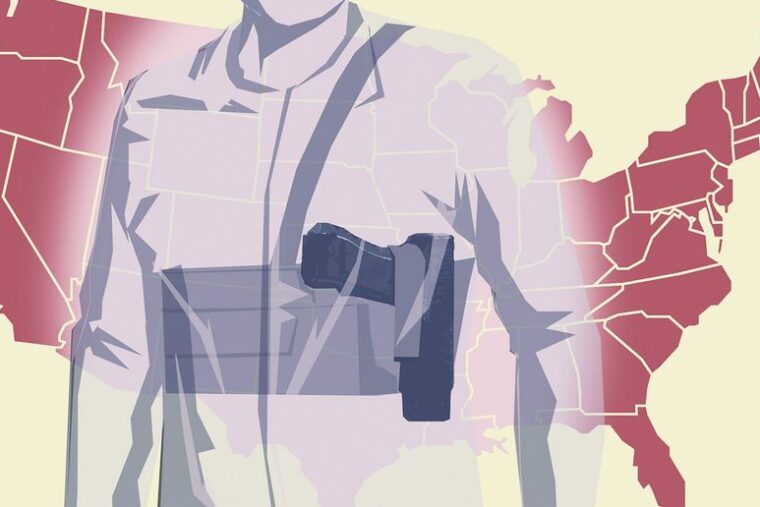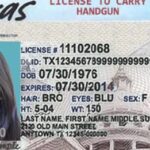washingtontimes.com
The importance of concealed carry reciprocity
By John R. Lott Jr.|Mar. 10th, 2025
OPINION:
Imagine a single woman driving across state lines at night, hoping she won’t become a crime victim if her car breaks down. Or a truck driver as he travels across the country with valuable merchandise. They can quickly run into trouble in states such as California, Illinois, Maryland, New York, New Jersey or Oregon, among the 10 states that don’t recognize concealed handgun permits from other states. Similarly, nine states don’t grant or make it difficult for nonresidents to get permits.
A bill before Congress would change that and let people who can legally carry concealed handguns in their states carry them across state lines.
There are 21.5 million concealed handgun permit holders in the United States, which doesn’t count people who carry in the 29 constitutional carry states where permits are no longer necessary.
Most of the country has reciprocity, allowing people to carry concealed handguns in other states. The average state allows people with concealed handgun permits from 30 other states to travel freely.
Permit holders are extremely law-abiding, losing their licenses for firearm-related violations at rates of thousandths or tens of thousandths of 1 percentage point. Police rarely commit crimes, but concealed handgun permit holders are even more law-abiding, with conviction rates for firearms offenses at just one-twelfth the rate of police.
Opponents argue that national reciprocity could lead to confusion about which gun laws apply in a given state, leading to arrests — but reciprocity is common. There is no evidence of a problem with out-of-state permit holders.
They also worry that the standards for getting a permit vary across states, but there is no evidence that permit revocation rates are higher in states where getting a permit is easier.
Despite all the fears of gun control advocates, there is a reason that more than 86% of police chiefs and sheriffs support national reciprocity. More than 90% of street police officers support concealed handgun laws. These are the people who see firsthand how reciprocity and concealed carry work. They know how important police are in deterring crime, but they also know that police almost always arrive at the crime scene after the criminal commits the crime and that self-defense is crucial to keeping people safe. Overwhelmingly, academic research finds that letting people carry concealed handguns reduces crime.
So much of the gun control debate is about things that might go wrong, but with reciprocity, we don’t need to guess. With tens of millions of people legally carrying concealed handguns, if gun control advocates could point to hundreds or even dozens of cases where people with out-of-state permits caused problems, their concerns would be something to consider, but the problems are exceedingly rare.
Americans don’t need to guess whether gun control advocates’ concerns are justified.
Two groups that benefit the most from carrying guns are the likeliest victims of crime (poor Blacks in high-crime urban areas) and physically weaker people (women and the elderly). These groups have experienced the most significant percentage increases in concealed handgun permits over the past decade (2015 to 2024), with concealed handgun permits for women increasing 112% faster than for men and permits for Blacks increasing 284% faster than for Whites.
Unfortunately, real life isn’t like the movies, where one woman can knock out and overpower several well-trained men. Even well-trained women often struggle to defend themselves against much larger and stronger men. Men also tend to be faster runners.
A firearm represents a much more significant change in a woman’s ability to defend herself. Men can readily hurt women without a gun, and if a woman is already in physical contact with the attacker so he can take away their gun, they are already in trouble.
The peer-reviewed research by one of us shows that homicide rates decline when people carry concealed handguns, be they men or women, but a woman carrying a concealed handgun reduces the homicide rate for women by about three to four times more than a man doing the same.
Although the House is likely to pass national reciprocity, the battle in the Senate is much more difficult. To pass the bill in the Senate, 60 votes are required to break the filibuster Democrats will wage, and at least seven Democratic senators will have to break ranks. However, Democratic senators need only look at the experience in their home states to see no problems with reciprocity. Six states with 12 Democratic senators recognize concealed handgun permits from the rest of the country: Arizona, Georgia, Maine, New Hampshire, Vermont and Virginia. In none of those states has there been any movement to restrict reciprocity.
Police are extremely important, but 720,000 officers cannot be everywhere and protect 340 million people simultaneously. Let’s ensure Americans aren’t afraid to cross state borders.
• John R. Lott Jr. is president of the Crime Prevention Research Center. He is the author most recently of “Gun Control Myths.”



